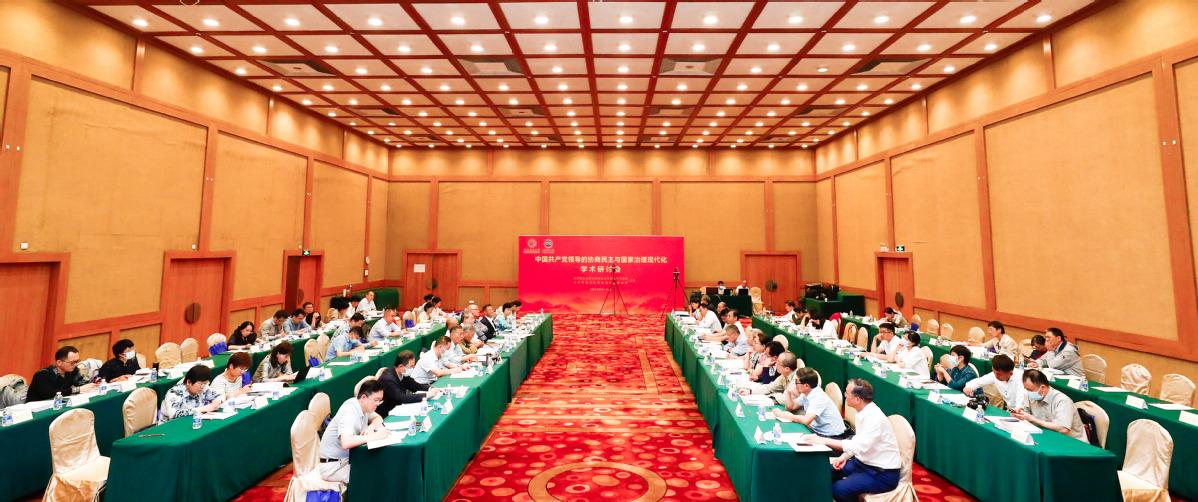In order to commemorate the centenary of the Communist Party of China, review and summarize the exploration process and important experience of the people of the whole country led by the party in the practice of consultative democracy, and give play to the important role of consultative democracy in the modernization of national governance, on September 25, the academic seminar on "Consultative Democracy and Modernization of National Governance Under the Leadership of the Communist Party of China" was held in Beijing.

Meeting site (courtesy photo)
More than 100 leaders, experts, and scholars from the National People's Congress, the National Committee of the Chinese People's Political Consultative Conference, the United Front Work Department of the CPC Central Committee, the Central Party School, the Chinese Academy of Social Sciences, the Central Socialist College, the Beijing Municipal Committee of the Chinese People's Political Consultative Conference, the Chinese University, Tsinghua University, Beihang University, Shandong University, the Office of Party History and Local History of Haidian District of Beijing Municipality, and the Xiangshan Revolution Memorial Hall attended the meeting through offline and online means.
Chu Guoqing, Secretary of the Party Committee of Beijing Union University and Director of the Research Base for the Construction of Political Civilization in Beijing, delivered an opening speech (Courtesy photo)
Experts and scholars attending the meeting focused on the theme of deliberative democracy and the modernization of national governance, and expressed many new views and new views. They believe that in the modernization of the national governance system and governance capacity, deliberative democracy has a unique institutional function and significant institutional advantages.
The meeting held that socialist democracy with Chinese characteristics is the most extensive, true and effective democracy for safeguarding the fundamental interests of the people. Socialist consultative democracy under the leadership of the Communist Party of China is a unique form and unique advantage of China's socialist democratic politics, an important way to realize the party's leadership, an important embodiment of the party's mass line in the political field, the main content of deepening the reform of the political system, an important component part of people's democracy in the whole process, and an important way for the Communist Party to govern and make decisions. In using institutional systems to ensure that the people are masters of their own affairs, deliberative democracy has a unique institutional function and significant institutional advantages. Democratic consultation is not only the beginning and important link of people's democracy in the whole process, but also embodied in the specific process of state governance such as democratic elections, democratic decision-making, democratic management, and democratic supervision.
Experts and scholars attending the meeting said that socialist consultative democracy is an important component part of people's democracy in the whole process, and there is great potential for research in this regard. We must adhere to and improve the socialist consultative democracy system with Chinese characteristics, promote the extensive and multi-layered institutionalized development of consultative democracy, help modernize the national governance system and governance capabilities, and ensure the long-term peace and stability of the country, the happiness and well-being of the people, and the prosperity and development of the party and the country.
Li Qiang, Director of the Party History and Local History Office of Haidian District, Beijing Municipality, delivered a speech (Courtesy photo)
According to reports, the meeting was jointly organized by the Beijing Political Civilization Construction Research Base of Beijing Union University and the Office of Party History and Local History of Haidian District of Beijing Municipality, and was strongly supported by the Theory and Practice Research Association of the Beijing Municipal CPPCC. Professor Chu Guoqing, Secretary of the Party Committee and Director of the Base of Beijing Union University, attended the meeting and delivered an opening speech, and Professor Xu Yongli, Chief Expert of the Base, delivered a closing speech.
Participating scholars made keynote speeches (courtesy photo)
Bao Xinjian, distinguished professor and doctoral supervisor of Shandong University, Zhang Feng, former vice president, professor and doctoral supervisor of the Central Socialist College, Chen Xu, deputy secretary general of the Beijing Municipal Committee of the Chinese People's Political Consultative Conference and director of the research office, Zhang Xiansheng, vice president of the Chinese Political Science Society and former director of the Political Research Office of the United Front Work Department of the CPC Central Committee, Zhang Shuhua, director of the Institute of Political Science of the Chinese Academy of Social Sciences, doctoral supervisor and member of the National Committee of the Chinese People's Political Consultative Conference, Mo Jihong, director of the Institute of Law of the Chinese Academy of Social Sciences and doctoral supervisor, Li Bojun, former director of the Office of the NPC Standing Committee's Deputies Qualification Examination Committee, and Wang Xiaohong, director of the Teaching and Research Department of the Central Socialist College and professor, made keynote speeches at the meeting.